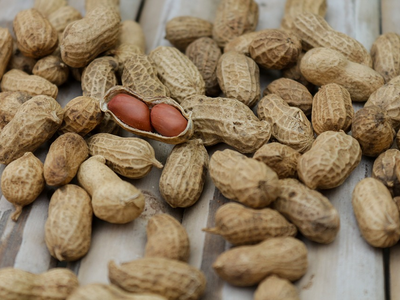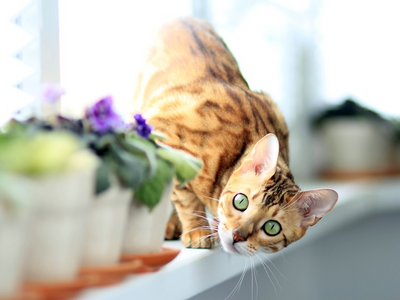25.03.2022
Are cats and carbs a cat-astrophic combo?
After millennia at the top of the food chain, our feline companions have developed unique biological needs. Unlike dogs and other omnivores, cats can only thrive on a diet of animal protein and water.
But does that mean carbohydrates are strictly off-limits, or is there some leeway? Are cats and carbs a good match, and can your carnivorous pet handle a rare sugary treat? Let’s find out which carb-rich foods can be on your pet’s menu and which should be denounced as forbidden fruit.
Do cats and carbohydrates mix?
If left to their own devices, cats would most likely feed on mice, insects, slugs, and other common pests. The pampered pet lazing about your house is an obligate carnivore, metabolically adapted to a high-protein diet. Animal protein is the feline’s primary energy source, and carbohydrates don’t play a significant nutritional role in their meal plan.
Because of their ancestral feeding pattern, felines have a reduced capacity to harness carbs for energetic purposes. Simple carbohydrates, such as glucose and sugar, hold no biological value to cats, but a limited allowance of complex carbs, i.e. fibre, can facilitate intestinal passage (more on that later).
Felines aren’t physiologically equipped to handle a high-carb diet. Their liver and pancreas lack the enzymes to process the nutrient efficiently. Too many carbs can contribute to the onset of several metabolic disorders, including diabetes mellitus, chronic pancreatitis, liver disease, and obesity.

Your pet is a ferocious hunter biologically designed to feast on meat!
Source: Piotr Musioł
What happens when cats eat carb-rich food?
As a rule, carbs shouldn’t account for more than 3% of your cat’s daily food intake. If you stick to the recommended allowance, is it okay to give your pet an occasional sweet (“sweet” being an operative term for high-carb foods, not actual chocolate)?
Let’s see what effect the following carb-rich foods can have on your cat:
- Fruit
- Milk
- Bread
- Processed food
Fruit
Fruit contains high levels of monosaccharides (mainly fructose), making it too “sugary” for our feline companions. Besides not having a sweet tooth, cats lack the enzymes to process simple carbohydrates. A small bite here and there won’t hurt, but regular servings can cause discomfort.
When given in moderation, high-fibre fruits and veggies can soothe acute digestive problems in cats. The soluble fibre with plenty of water can help with constipation and symptoms of inflammatory bowel disease. If your cat’s struggling with chronic gastrointestinal issues, you can feed them an occasional veggie snack.
It’s best to cut the fruit or veggie into kibble-sized pieces and remove everything but the flesh (stems, seeds, skin, etc.). You can also gently steam it in unseasoned water or mash it into a puree.
Keep in mind that some fruits and veggies are highly poisonous to cats! Allium plants (onions, garlic, chives, etc.), citruses, and grapes contain toxic substances that can seriously damage your cat’s internal organs.
If you plan on giving your cat some meat-free treats, stick to the following:
|
Fruits |
Veggies |
Plants and fungi |
|
Milk
Most cats are lactose intolerant, which doesn’t stop them from being total milk-fiends. While your pet may be naturally drawn to the fat and protein in dairy, you shouldn’t indulge them. The sugar content in milk and milk byproducts will upset their stomach.
Cats can’t fully break down lactose since they don’t produce lactase—an enzyme required for digesting milk sugar. The excess carbs in their system can cause mild to severe gastrointestinal problems, such as:
- Bloating
- Diarrhoea
- Flatulence
- Vomiting
- Abdominal pain
The symptoms should disappear eight to twelve hours after ingestion, i.e. once the sugar is completely out of their digestive tract.
When it comes to cats, lactose intolerance is the norm, so kittens are also not immune. If you have a foster kitty who hasn’t started eating solids yet, don’t give them milk from another species, or they’ll suffer from diarrhoea, vomiting, and similar GI issues. Plant-based alternatives, such as almond and soya milk, are also off the table since they’re too caloric.
In their mother’s absence, kittens should drink a milk replacer formula (KMR) to maintain healthy development. Once they’re old enough for solid food, it’s best to feed them specially formulated cat food that’s nourishing and light on the stomach.
If you want your cat to try dairy, plain yoghurt is better than cow milk. This milk derivative contains probiotic bacteria that are good for the gut when given sparingly.

I swear I won’t drink it. I just need a whiff!
Source: @adorablesushi
Bread
A small bite of plain bread won’t do your cat much harm, but they shouldn’t eat it regularly. Besides being loaded with carbs, it’s low in other bioavailable nutrients, mainly protein, vitamins, and minerals.
Depending on the type, bread can have between 60 and 95 calories (e.g. whole wheat bread has 92 calories per slice). The recommended daily intake for the inert indoor cat is 40 calories per one kilo of their current weight. You need to make sure your pet’s regular meals and treats fit into the appropriate allowance, or they may start piling on pounds.
Whether it’s buckwheat or spelt, bread is a grain byproduct and therefore too caloric for your feline. Grain, in general, is used to add bulk to low-quality cat food and is not particularly nourishing.
If your cat wants to try bread, give them the plainest loaf money can buy. Seasoned types, like pan tumaca or tomato bread, are delicious, but all that spice will only flare up your cat’s stomach.
When baking at home, make sure your cat doesn’t lick the utensils or bowls. Raw dough contains yeast—a substance felines can’t fully process. The residue can ferment in their gut and produce alcohol, which is incredibly toxic to cats.
Processed foods
Heavily processed foods have a high percentage of refined carbohydrates, which are harmful to cats in the long run. Unlike digestible carbs in fruit, whole grains, nuts, and legumes, refined carbs are stripped of all nutrients.
Refined carbs are typically found in:
- White bread
- Pizza dough
- Pasta
- Pastries
- White flour
- White rice
- Sweets
- Breakfast cereals
This type of food can contain low-quality fats, mainly saturated and trans fats, as well as added sugars and salt. Excess fat and sodium can lead to cardiovascular problems, especially in susceptible breeds (e.g. Siamese and Persian cats).
Processed foods typically have artificial ingredients, such as sweeteners, preservatives, and taste enhancers. Your cat’s meals should be as natural as possible to minimise the risk of cancer, gastrointestinal disease, obesity, and other chronic conditions.
Keep in mind that kibble is also considered heavily processed food. Cat biscuits are made with a mixture of meat derivatives, starch, and vegetable protein, pressure-steamed and extruded until the dough is completely solid. While not entirely devoid of nutrients, dry food is less nourishing than wet food, so you shouldn’t worry if your pet won’t eat their biscuits.
Which nutrients does your cat need in their diet?
Your carnivorous pet needs the following nutrients to thrive:
- Water
- Protein
- Fat
- Vitamins and minerals
Water
Cats should drink between 50 and 60 millilitres of water per one kilo of their current body weight. That means an average adult cat who weighs 3.5–4.5 kg needs approximately 250 ml per day. Larger breeds, such as Maine Coons and Ragdolls, require even more to stay hydrated.
The recommended daily allowance can also vary depending on your cat’s life stage. Nursing kittens get enough fluids from breast milk and don’t need much water, while elderly cats tend to drink more because of underlying health conditions.
Felines who don’t get enough fluids are at risk of developing urinary obstructions, urinary tract infections, and renal disease. Insufficient water intake can also affect the cat’s ability to absorb nutrients, causing tented skin, sunken eyes, appetite loss, and lethargy.
Cats are susceptible to dehydration because most of them don’t like drinking water from a bowl, especially if it’s stale. Make sure your pet has access to fresh drinking water, and remember to clean their bowl regularly.
You should also introduce moisture into their diet by serving semi-moist or moist cat food instead of heavily processed products, like kibble. It’s okay to feed them dry biscuits from time to time but always in combination with wet food.
Protein

Animal protein fuels your cat and provides essential amino acids.
Image (c) Untamed
Protein is a fundamental macronutrient in the feline diet, responsible for vital physiological functions. Besides sustaining your cat’s muscle and tissue growth, protein enables the synthesis of amino acids.
Compared to other animals, cats have a limited ability to produce amino acids and can only get them from animal tissue. The protein in soybean meal, wheat gluten, rice, Brewer’s yeast, or other plant-based sources does not provide taurine, a vital micronutrient for felines.
Taurine insufficiency can cause several life-threatening diseases, such as:
- Central retinal degeneration
- Abnormalities of the central nervous system
- Dilated cardiomyopathy
- Reproductive problems
Your cat needs regular servings of meat-based food, either homemade or commercially sold. If you have the time and energy to cook for your pet, always use lean whole meat rich in protein, such as chicken or turkey.
As for commercial cat food, look for products with more than 50% protein and less than 3% carbs.
Fat
Cats need some fat in their diet, ideally up to 20% of the overall meal plan. Felines can’t produce essential fatty acids, like omega-3 and omega-6, that help with:
- Heart disease
- Blood coagulation
- Skin disease
- Inflammation
- Regeneration
- Shedding
Fish and chicken contain enough fatty acids to cater to the feline’s needs. In some cases, a vet can prescribe fish oil as a supplement, e.g. if a cat suffers from heart disease.
Keep in mind that saturated and trans fats can be harmful to your pet in the long run. That’s why you should avoid giving them fatty meats, like pork and pork derivatives, and opt for lean meat instead. Instead of cured sausage, opt for ham.
Cats who eat fatty meat regularly are at risk of developing health issues, such as:
- Hypertension
- Obesity
- Chronic kidney disease
- Hyperthyroidism
Vitamins and minerals
The bioavailable micronutrients in whole meat and giblets are enough to keep your cat healthy. You shouldn’t give them dietary supplements unless a vet instructs you to do so. A surplus of vitamins or minerals in your cat’s diet can negatively affect their health. Vitamin A toxicity can cause bone deformities, skin disease, and digestive problems in felines.
If your cat enjoys a well-balanced diet, they don’t need vitamin supplements. High-quality wet food already contains all beneficial micronutrients, including:
|
Micronutrient |
Function |
|
Vitamin A |
Sustains eye function, bone development, dental health, reproduction, and skin maintenance |
|
Vitamin B |
Strengthens the immune response, sustains cognitive function and digestion |
|
Vitamin K |
Enables blood clotting |
|
Zinc |
Vital for processing carbs, lipids, and nucleic acid |
|
Niacin |
Metabolises protein, fats, and carbs |
|
Calcium |
Maintains bone and tooth health |
|
Selenium |
Acts as an antioxidant, reduces shedding and hairball formation |
|
Potassium |
Regulates nerve function, muscle contraction, and cardiac rhythm |
|
Magnesium |
Enables enzyme function and helps metabolise protein, carbs, and fats |
Untamed—the natural choice for your carnivorous cat

Untamed—a fitting feast for our feline friends!
Image (c) Untamed
Untamed food is designed to fit your cat’s specific physiology, ensuring each recipe offers the optimal nutrient ratio. We don’t use meat derivatives, grain-fillers, preservatives, or any unnecessary ingredients in our meals, relying solely on the natural bioavailability of meat.
Our carefully prepared products are:
- High in protein—A single serving of Untamed food has two times animal protein than the industry-standard
- Made with whole meat—We use premium, human-grade meat cuts for all our products
- Vet-formulated—Untamed food is formulated by vets, meaning it’s highly nutritious and free of all known allergens or irritable substances
- Ethically produced—We get all our ingredients from sustainable sources and only use recyclable packaging for our products
- Impossible to resist—Untamed food is entirely fussy eater approved! Our feline delicacies are irresistible to cats of all ages and sizes
What makes Untamed the ultimate feline diet?
The meat we use for our feline delicacies is naturally filled with amino acids and other beneficial nutrients. All Untamed recipes are made with premium:
- Chicken breast
- Duck breast
- Chicken liver
- Salmon fillet
- Tuna steak
- Sardine and mackerel fillet
- Prawns
- Shrimp
We gently steam our meals to retain the ingredients’ nutritional value and ensure the final product arrives fresh at your doorstep. Untamed food doesn’t require any additional preparation—it comes ready-to-serve, and no defrosting or heating is needed.
Guaranteed freshness isn’t the only perk of switching to the Untamed diet. Long-term members of our proud clowder have noticed significant improvements in their cat’s digestive health, along with other benefits:
|
Timeline |
Health benefits |
|
Within a week |
|
|
After two months |
|
|
Within four months |
|
|
Life-long benefits |
|
Check out our amazing recipes!
Tired of dealing with your fussy cat? Make them an offer they can’t refuse! Take a brief online quiz and create a unique menu according to your pet’s preferences and food sensitivities. You can choose from an assortment of gravy and jelly recipes made with all-natural ingredients:
- Chocka Chicken in Jelly—Extra moist chicken breasts soaked in jelly
- Tuck-in Tuna in Jelly—Dolphin-safe tuna simmered in appetising fish broth
- Chocka Chicken with Duck in Jelly—High-quality chicken breast mixed with whole duck meat, served in delicious jelly
- Tuck-in Tuna with Salmon in Jelly—Tuna steak soaked in jelly and served with high-quality salmon fillet
- Chocka Chicken in Gravy—Shredded chicken breast simmered in natural gravy
If your cat is prone to food allergies, we recommend our single-protein-source recipes—Chocka Chicken in Jelly and Tuck-in Tuna in Jelly.

Untamed’s Tuck-in Tuna in Jelly is perfect for the more sensitive kitty!
Image (c) Untamed
Want to join our clowder?
You can join our community in a few simple steps! Sign up online for a custom-made cat food tester pack. To get your first Untamed meal box at a competitive price, all you have to do is:
- Visit our TRY NOW page
- Tell us about your cat (e.g. food preferences and sensitivities, life stage, etc.)
- Pick a meal plan and place your order
Your first delivery will arrive within a day, with no additional shipping fees! Once your cat approves the dishes, we’ll start sending a fresh batch at the same time every month.
If you want to change the contents of your cat food subscription box or postpone a delivery, feel free to reach out, and we’ll happily make the adjustments.

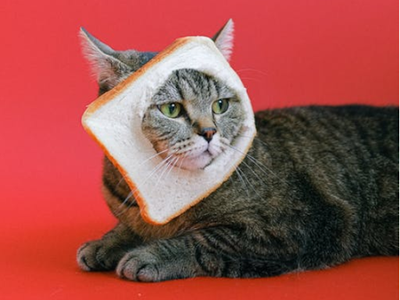
![Associated image for Best food for Ragdoll cats in the UK [Broken Down]](http://untamed.com/cdn/shop/articles/featured_best_food_for_ragdoll_cats_uk_400x300_crop_center.jpg?v=1646818249)
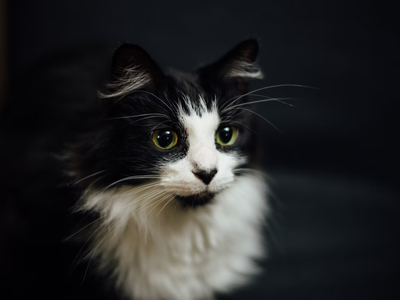
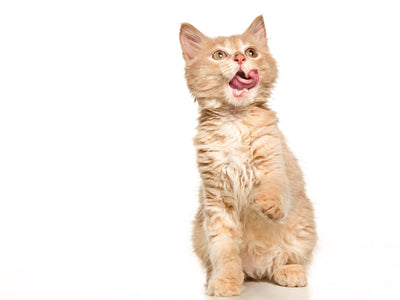
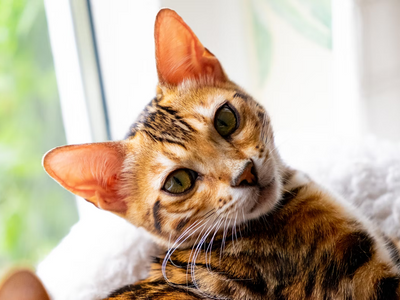
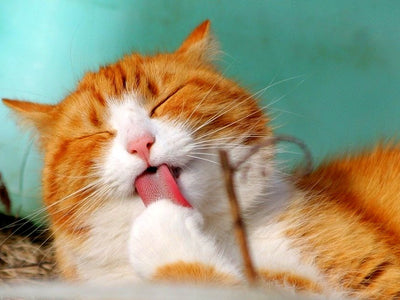
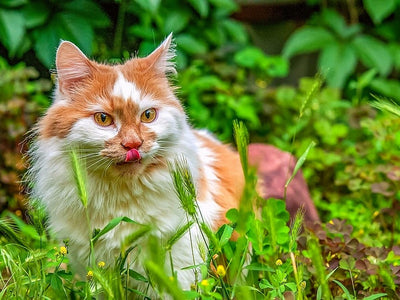
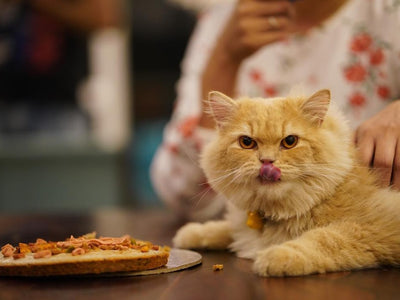
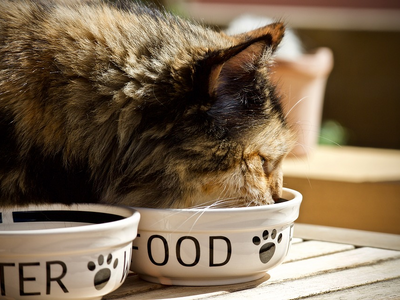
![Associated image for What human food can Sphynx cats eat? [Comprehensive list]](http://untamed.com/cdn/shop/articles/what_human_food_can_sphynx_cats_eat_Featured_400x300_crop_center.jpg?v=1648705074)
